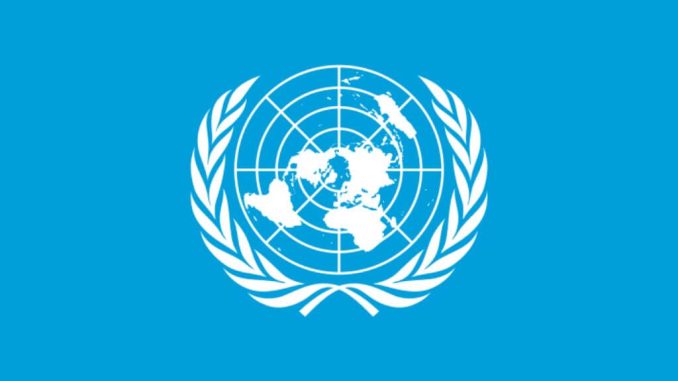
UN Warns Residents of “Uninhabitable” Gaza, Famine
The UN reports that the situation for civilians in the Palestinian territory is getting worse after three months of nonstop Israeli attacks in the Gaza Strip.
“Three months since the horrific Oct. 7 attacks, Gaza has become a place of death and despair,” said Martin Griffiths, head of the UN emergency relief organisation OCHA.
Even areas where civilians had relocated at Israel’s request had been bombed. Medical facilities were also “relentlessly attacked.” In the cordoned-off coastal area, the Israeli army has conducted operations in and around hospitals on multiple occasions.
It claims that they are being misused for terrorist activities by the Islamist group Hamas. According to Griffiths, desperate people looking for safety are taking over the few hospitals that are still partially operational. “A public health disaster is unfolding,” he said.
“Infectious diseases are spreading in overcrowded shelters as sewers spill over. “Some 180 Palestinian women are giving birth daily amidst this chaos. “People are facing the highest levels of food insecurity ever recorded and famine is around the corner. “For children in particular, the past 12 weeks have been traumatic,” said the UN Emergency Relief Coordinator.
“No food. No water. No school. Nothing but the terrifying sounds of war, day in and day out,” the coordinator added. Simply put, the Gaza Strip is now “uninhabitable,” Griffiths emphasized. More than 1.1 million children are at risk due to a deadly cycle that is being exacerbated by disease, according to a statement released by UNICEF on Friday.
A UNICEF survey conducted on December 26 found that 90% of the 1.1 million young people in the area do not receive enough nutrients. “Children in the Gaza Strip face a deadly triple threat to their lives, as cases of diseases rise, malnutrition plummets, and the escalation in hostilities approaches its fourteenth week,” UNICEF said.
For nearly three months now, Israel has been at war with the Islamist Palestinian organization Hamas in the Gaza Strip. 22,600 Palestinians have been killed, the health authority under Hamas’s control has announced. The figures are deemed credible by the United Nations.
The health authority added that in the course of the Israeli army’s continuous fierce fighting against Hamas in the Gaza Strip, another 161 people had died and 296 had been injured in less than a day. “Children in Gaza are caught in a nightmare that worsens with every passing day,” said Catherine Russell, UNICEF’s executive director.
According to the report, starting on December 17, the number of cases of diarrhea in children under five years old increased from 48,000 to 71,000 in just one week, or 3,200 new cases every day. It further stated that because of the severe lack of access to clean water and sanitary facilities, displaced children and their families are unable to maintain the standards of hygiene required to ward off illness.
The study confirmed that children who have persistent diarrhea are at a heightened risk of dying.
“The futures of thousands more children in Gaza hang in the balance. The world cannot stand by and watch. “The violence and the suffering of children must stop,” Russell said.
Witnesses in the southern Gaza Strip reported seeing intense fighting again on Friday in the vicinity of Khan Younis. A DPA employee stated that they could constantly hear heavy detonations and light weapon shots. Nuseirat, Bureij, and Maghazi refugee camps were being penetrated by Israeli troops.
Locals were escaping in donkey carts, mostly to areas that the Israeli army had marked as safe, toward Rafah and other areas of Khan Younis as well as Deir al-Balah. Food was in short supply, and many people’s only source of shelter was flimsy plastic sheeting.
The Israeli army declared that it had taken out multiple rocket launchers that were aimed towards Israel and were located in Khan Younis and close to Bureij. Additionally, fighter jets persisted in their attack sorties, during which an unspecified number of Hamas fighters and civilians perished.
Since Thursday, there have been attacks on over 100 targets in the Gaza Strip. The vast Israeli military operation in the Gaza Strip was purportedly carried out in retaliation for a series of well-planned terrorist attacks carried out on October 7, 2018, by Hamas and other radical Palestinian organizations.
Over 1,200 people were slain by them, about 800 of whom were civilians. In the meantime, Israel reportedly wishes to increase international pressure on South Africa to drop its genocide case at the International Court of Justice in The Hague related to the Gaza War.
The news portal Axios reported on Friday night that the goal is to prevent a court-issued temporary injunction to end the fighting immediately. The report cited a copy of a telegram sent by the Israeli Foreign Ministry to its embassies abroad. It gave the embassies instructions to convince local politicians and diplomats to oppose South Africa’s lawsuit.
The lawsuit’s hearings are scheduled for the following week. Accusing Israel of genocide, South Africa filed a lawsuit against the country in the top UN court. The court has set January 11 and 12 for the hearings.
In general, the rulings rendered by the UN court are enforceable. Judges, however, lack the authority to compel a state to carry them out. In its lawsuit, South Africa is citing the Genocide Convention.
This convention has been signed by both states. In order to defend the rights of Palestinians, South Africa believes that the UN judges should first order an end to the violence against them in summary proceedings. Israel firmly rejected South Africa’s accusations, saying that Hamas was solely responsible for the suffering of the Palestinians in Gaza.
Israel reiterated its claim that it was making every effort to reduce civilian casualties during the conflict. A ruling by the UN court might have important possible effects that go beyond the law and include useful bilateral, multilateral, economic, and security policy ramifications. (NAN)
read more:
- Watch Nigerian Movie Today Showing PHD in Love 6 January 2024
- Commanding The Day by Paul Enenche 6 January 2024 | Midnight Prayers
- Awaken Abuja 2024 with Evangelist Isaac Oyedepo Day 3 | Saturday 6th January
- WOFBEC 2024 Day 5 Live Morning Session 6 January | Doing the Impossible
- Joel Osteen Today Message Saturday 6 January 2024 | READ & WATCH NOW
- Live COZA 12 Days of Glory 2024 – Day 5 Saturday 6 January Morning Session | Biodun Fatoyinbo







